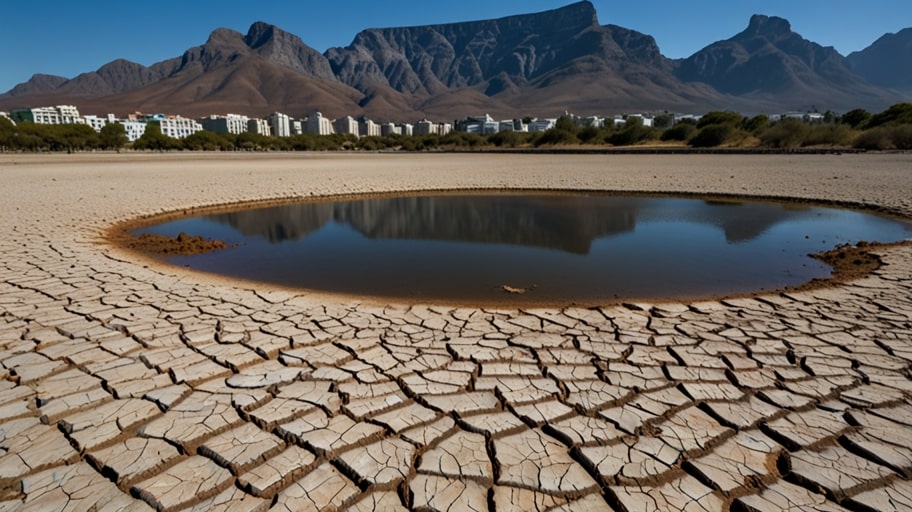The mood in Cape Town is certainly tense due to a very real scarcity of water resources. The low reservoirs and increased risk of a water crisis have become a daily dinnertime topic in the city.
The daily water rationing to households, limited to a minimum amount of liters, has been accepted by them with some effort. The unending drought that has come to its third year is a true show of the city’s resilience even in the face of the wrath of the sun.
The first to feel the economic impact were the local small and medium-sized tourism businesses, which were the hardest hit. The owners of the closed hotels say that they were forced to do so, due to the cancellations, as tourists are afraid they will experience a water shortage.
The vacant beaches that used to be a favorite spot for tourists had to be cleaned every evening to avoid the garbage problems. The locals have seen a significant decrease in the number of people in their shops, as the only thing they were relying on were the surges that were popular during specific periods.
Reports of tourists’ fear of being dehydrated are also widespread throughout the entire city. This has led to at least some of the residents in the affluent areas hoarding bottled water, to the disadvantage of the residents of the townships, who are still relying on communal taps for their sustenance. The mayor’s scepter is constantly being shaken as various stakeholders from society demand to be recognized as the rightful claimants of the water at the essential meeting on water resources.
The introduction of effective recycling has been a complete failure due to the fact that the people in charge of the project chose to arrange for a budget cut in order to maintain other services at the expense of the environment.
Furthermore, the accumulation of plastic in the dumps has gone to the extent of preventing even those who wanted to work as waste pickers from being able to do so. Green groups have been strong on this front, lobbying for changes that can power the country’s renewable energy, a road hopefully, that when treaded on, solves the issues of pollution.
On the other hand, the crime rate underwent noticeable changes with some unpleasant happenings, such as the stealing of cars, taking place near popular tourist areas. There was not only scarce police to be found around, but also those who could not have been at peace with the situation.
Neighborhood watches had the instinct to take matters into their own hands by going around with torches at that time. The world-famous charm of the city is quickly descending into an aura of fear, which drips down the welcomed reputation of the city.
The people of Cape Town found tremendous joy at the cultural events taking place around them when a jazz music concert was staged at the waterfront. The musicians were so magical that they seemed to lift the audience into the vast universe, which was full of stars.
However, for local people, the ticket prices were not affordable, and thus they were excluded from the celebration. It was the celebration of the city’s soul itself, and that really became the main center stage as art had to counterbalance the basic need of survival.
Education is currently disrupted with the emergence of parents protesting the decision to close schools. They are upset about the overcrowded conditions and the insufficient books in classrooms. In their quest for better materials, teachers are going on strike and marching downtown. Thus, due to upheavals, the youth of Cape Town are at great risk of falling behind in the new skill set requirement of the global market and economy.
It’s good to see technology still has its share in helping solve this water scarcity woe, where a neighborhood app can now trace water consumption. Users affirm their behavior change by being able to post their data to the app on a daily basis.
This success seeks to prompt others to follow suit, but the digital divide still exists in townships with vast sectors not being able to connect to the city-wide internet. It is the same people who are supposed to benefit who are now out of the loop.
The labor dispute is getting worse as dockworkers refuse to service the port. Consequently, the ports are congested with export ships that are unable to discharge and are waiting to be served, thus costing the harbor several million dollars a day.
Retailers, finding themselves in a situation where they have nothing to put on the shelves, have initiated negotiations. The closely related aspects of the wage sum up as part of the strike cause, which reflects an abiding discontent with the economic strain in the city.
Drastic cases of dehydration are reported at the health clinics in Cape Town. Some mobile units are placed in the sun-baked parish parking lots where they provide shelter and treatment for the residents exposed.
Meanwhile, the hospital doctors are now working hard to reduce the incidents of waterborne diseases that have shot up recently, straining the hospital facilities, leading to a shortage of staff providing treatment services. Taking the matter seriously, the health system of Cape Town is still managing the situation where it aims to control its people to sustain a healthy life, which is now at risk due to water scarcity.
It has become a tradition in many communities to have a lot of sports, especially football, at local grounds where the community is one. Soccer games, which are held at these grounds, are free and bring the whole community together.
The sport, in this way, removes any barriers present and is a unifying factor for society. The game of soccer, which is played in the fields of Cape Town, is free and offers the poor residents of the city some fun amidst the misery and arguments amongst themselves.
The growing tension of immigration has led to the fact that refugees are deprived of employment opportunities. On the other hand, the number of local individuals being involved in the weaker handed is increasingly comprehending the availability of sunshine at the palmiest shelter.
The People initially are affected by a condition where the resources available cannot accommodate all the people who want to use them, hence a debate is triggered. Moreover, the city’s commitment to transition from its current status to a friendlier home for all is a demanding process, which is part of the ongoing struggle towards recovery from a difficult situation.
An interesting conversation was started when a solar farm project was proposed and farmers are divided on the issue of land usage. People who support the initiative say it is an excellent chance to get energy from the sun. However, critics are worried the land will be spent.
The failure of the power grids as a result of the huge demand has led to some power outages. The future of the energy of Cape Town, which is linked to environmentally friendly projects, depends on the decisions that will be made, keeping the pace of progress while not hurting tradition.
It is amazing to notice that the mural is becoming a form of art for communities as they display various colors and themes on the walls. The artists are the bearers of the cultural narrative and the people’s fighting spirit, which have been dimmed but now are as bright as the sun in the strong winds of the city.
The inhabitants of the city who have allocated funds to run the project, whether they expected miracles or realized they had no choice, are hearty in praising one who is determined. But, whether we see it or not, the process of becoming middle-class infects the surroundings of traditional cafes, thus invoking the feelings of the disappeared glorious past in those vibrant neighborhoods.
Today’s news reveal the fact that Cape Town is at the break of its cholera problems and the jazz hot from all around the world. The city, though resilient, has been feeling the strain over it all and is now standing up to fight for a balance. Those, whose strength of character is the bond, carve out a present that celebrates the spirit of it but, also, that does not step back from meeting the dry and divisive real problems.










